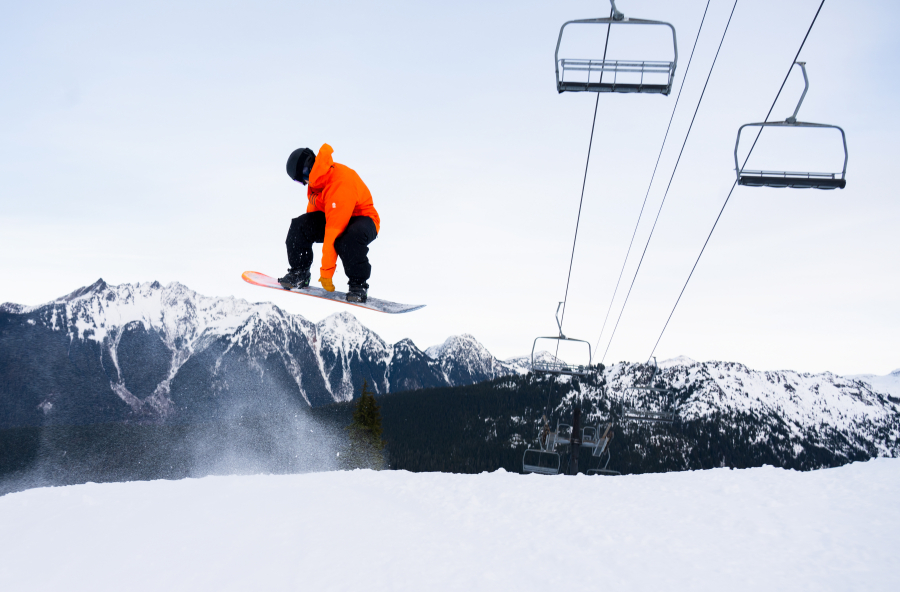Skiers and snowboarders returned to a more sustainable Mt. Baker Ski Area, with millions spent to upgrade power sources to reach a future goal of using renewables.
More than a foot of snow fell earlier this month, providing enough on top of the base to finally open the mountain to pass holders Dec. 13, and to the general public on Dec. 14. The opening is about a month later than last year due to warm and rainy weather, but skiers and snowboarders said opening day conditions exceeded their expectations.
This year’s offseason was especially busy for administrators at the ski area as they worked to update the infrastructure of the 70-year-old ski hill while also setting up operations for a more sustainable future, said Amy Trowbridge, the ski area’s marketing manager.
Specifically, they overhauled part of their generator system with a simple goal — to reduce their usage of fossil fuels.
Perched at the top of Highway 542 deep in the Cascades, power lines don’t reach the ski area, and they’ve used individual diesel generators to run each lift and lodge for years. Over the summer, they combined the operations of chairs 4, 5 and 6 and the Raven Hut Lodge to function from one generator, as opposed to four. At the lifts, they swapped diesel motors for electric.
“There’s other operational benefits to having electric motors in the lifts, but certainly our eye right now is on the future of just consuming less fossil fuel and looking towards other renewable resources that could come in,” CEO Gwyn Howat said.
Howat said after running a system test — where they overloaded the lifts with sandbags and blasted all the lights and systems at the Raven Hut — she estimates they’ll utilize less than half the fuel for the complex than in years past.
The work didn’t stop there.
Summer hikers descending from Artist Point might have noticed bulldozers and pavers enlarging the parking lot at White Salmon Day Lodge, which temporarily has increased parking capacity by about 10 percent. In the future, the ski area plans to build a larger power consolidation facility to connect White Salmon, Chair 7 and Chair 8 to the Raven Hut energy complex to run off of one power source. Similar plans are in place to run the Heather Meadows Day Lodge and surrounding lifts on one generator.
“We are investing literally millions of dollars into becoming more efficient with our use of fuel, and then also trying to lay groundwork for the infrastructure to be able to shift eventually to renewables,” Howat said.
The trees removed for the parking lot were given to local tribes for salmon habitat, she said.
The millions of dollars the ski area is spending on sustainability efforts, combined with the inflation of supplies, rising labor costs and keeping the business viable, reveals itself in the rising prices of lift tickets. This year, a day pass for an adult sits at $91.20, up from $63.02 for the 2019-2020 season.
While the prices rise, they still remain relatively cheap compared to other ski areas in Washington — Stevens Pass starts at $125, and Crystal Mountain at $119 — and across the nation.
“It certainly is our intention that the skiing and snowboarding remain accessible to people in Whatcom County,” Howat said. “Not as just an occasional thing, but something they can do through the course of the winter, and that, we understand, is becoming more challenging, given the strains on people’s personal finances.”
Howat is active in the industrywide discussion surrounding accessibility, especially in her role on the board of directors for the National Ski Areas Association. Current programs focus on increasing access to youth — the next generation of shredders.
The mountain offers programs for all Whatcom County fifth-graders to ride free and for children ages 4-6 to ski for free with parents paying half-price for lift tickets.
Right now, they are connected with Vamos Outdoors — an organization that connects Latino, migrant and multilingual youth to recreation — and the Xwlemi Nation Family which brings Lummi and Nooksack youth to the mountain. They also host the Mt. Baker Snow School, which provides science education and a snowshoe experience for grades six to 12.
“It’s on my mind that as the industry shifts and large equity firms and for-profit organizations take a hold on public lands and within the recreation industry, how are we going to continue to try and facilitate access and accessibility for people on public land?” Howat said.
To Howat, recreation like skiing and snowboarding is important to the flourishing of individuals and the community. A day on the hill can foster positive emotions, engagement, relationships, and a sense of meaning and accomplishment, she said.
Mt. Baker’s oddball status, as one of the few independently and originally owned ski areas left in the U.S., allows it to invest in the people and the place it gets to operate — at the foot of Mount Shuksan and a stone’s throw from its namesake Mount Baker.
“You can sense it when a place is grounded and rooted in a sense of place, versus its purpose being to generate profit,” Howat said.
One example Howat pointed to is the lack of advertising and sponsorships anywhere on ski resort grounds — no signage on chair lifts, no logos on maps and no ads hanging in lodges.
“We consciously choose not to do that, so that we create a sense of place,” she said. “When you come to Mount Baker, you’re not just coming to another city in the mountains, another American logo-ized marketplace experience in the mountains. You know you’re at Baker.”
When asked if corporate entities, like Vail Resorts or the Alterra Mountain Company (the parent companies of the chains that offer the expansive Epic and Ikon passes), have ever approached them with an offer to buy them out, Howat smirked.
“No,” she said. “Our elbows are out pretty far.”



